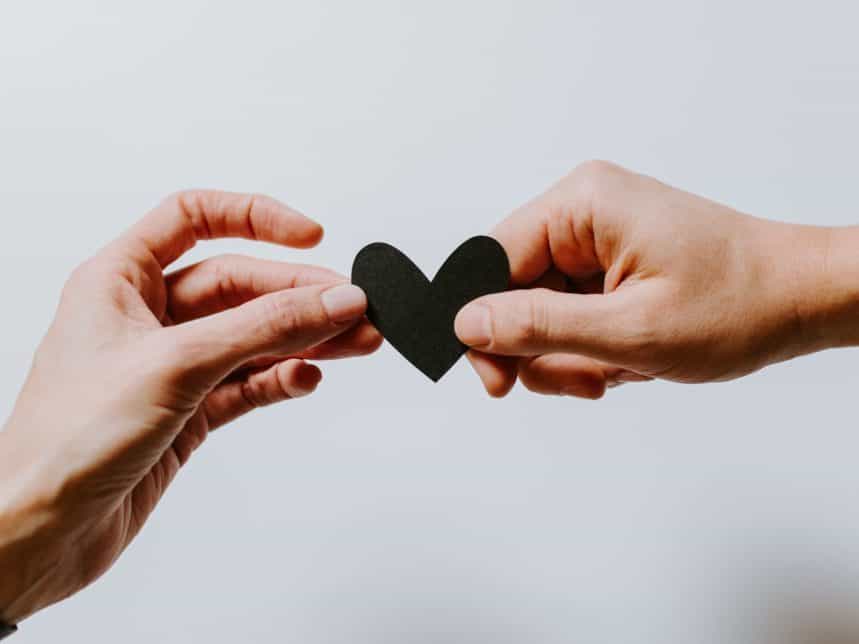- It’s good to occasionally assess how things are going in your relationship
- At the same time, it’s important to give the relationship a chance to get off the ground and not be hypercritical
- Here are four signs that you’re self-sabotaging your relationship

What is relationship self-sabotage?
It can be easy to get mad at the universe after a string of failed dates, but sometimes, we are the only thing standing in the way of us achieving a happy, fulfilling relationship.
If you’re a self-saboteur, it’s possible that you might feel as though you don’t ‘deserve’ a solid relationship, and so consciously (or subconsciously) act in a way that prevents fledgling relationships from ever getting off the ground.
Sometimes it can be hard to recognise self-sabotaging behaviour – but here are four potential signs of it in action.
You’re overly concerned with getting hurt
There’s a risk of getting hurt in any relationship – but the whole point is that it’s a risk worth taking. If you’re too bogged down in wondering what if, that’s a sign you’re potentially sabotaging things before they’ve even begun.
This could manifest in different ways. Perhaps you’re really reluctant to let your guard down and let your true feelings show. “Vulnerability often involves exposing ourselves personally in a manner that could potentially lead to feelings of shame, embarrassment, self-criticism or other uncomfortable emotions,” psychologist Lee Land tells HuffPost.

Writing for Cosmo, journalist Paisley Gilmour elaborates: “This is when you allow yourself to get to a certain point in a relationship before pulling back. Maybe you’ve seen too many sad films or really took to heart the saying ‘love hurts’… whatever the reason, avoiding pain is the outcome.”
Although opening up may feel ‘wrong’ if you’re usually quite a guarded person, it can have huge rewards. “Through emotional openness and vulnerability people can improve their connections in close relationships and develop true intimacy,” Land says.
Ultimately, you’re dooming the relationship if you’re expecting the other person to open up while you refuse to let them in, even after months of dating. It’s not fair to keep someone in a one-sided relationship – either let your guard down or let them go.
You’re preoccupied with wondering what others think
It’s not a good start if at every step of the way you find yourself wondering what other people make of your relationship. Sure, it’s normal to ask your friends’ opinion of your partner – but if you’re valuing their view on your relationship as more important than your own feelings, that’s not a great sign.

As Gilmour puts it: “For some people, the opinions of others far outweigh that of their partners. This can be hugely damaging to a relationship.” She goes on to say that if you tend to cater to other people’s needs before the needs of your partner, that’s also not a promising start.
If you find yourself questioning what people will say every time you and your partner do literally anything, you need to reassess your priorities. If your friends are true friends, your happiness will be their happiness – so take a step back and consider your own feelings for a change.
You’re being unrealistic
Thanks to fairytales and pop culture, many of us often grow up with a skewed idea of what a relationship should look like. When you’re 13, it’s more understandable if you hold the view that a relationship will solve all your problems and will be absolutely perfect 100% of the time. But when you’re 33, it’s time to take stock and realise that this is an immature mindset to have.

Refrain from being overly critical of your partner. You might have a mental checklist of things you want your ‘ideal’ partner to have, but acknowledge that this ‘ideal’ can only ever exist in your head. Humans – yourself included! – are complex, flawed beings, and there’s no way you can expect your partner to live up to impossibly high standards.
You’re at risk of sabotaging your relationship before it’s begun if you’re doggedly adhering to crazy criteria. “The number one thing that seems to cause dating anxiety the most is the pressure of meeting expectations, whether it’s theirs or their dates’,” expert Marissa Ventura tells Bustle.
Gilmour elaborates in another article for Cosmo: “assumptions about what constitutes romantic compatibility might not be the best basis upon which to decide whether a relationship gets the green light. They’re based on tired old myths and a (monogamous) relationship model we’ve been sold since the dawn of time by romantic comedies and love songs. With so many of us never making it to a second date, and the number of marriages gradually decreasing, could it be time to have a rethink about what romantic compatibility actually is?”

Dr Meg-John Barker, academic psychologist and author of The Psychology Of Sex, suggests focusing on how your needs are fulfilled by other relationships in your life in order to prevent yourself from lapsing into expecting too much of your partner.
“With one person you could be sexually compatible and love doing the same stuff, so they could be the person you go to museums with and have sex with. There could be another person you cohabit with, and with whom you have very similar life goals,” they explain. “If we could let go of all the myths about the kind of relationships we should be having, then we could have these amazing relationships where different needs are met by different people.”
You don’t address any negative feelings or worries
Healthy relationships are free from resentment – any issues are addressed head-on and dealt with immediately. In an unhealthy relationship where you’re self-sabotaging, issues go unaddressed and become worse over time.

Mary Retta writes in MindBodyGreen: “A big red flag for self-sabotage is having negative emotions about your partner or relationship but refusing to address them. Feeling anxiety, anger, frustration, or doubt in any relationship, romantic or not, is totally normal – but refusing to speak to your partner about these fears signals that you’re not interested in fixing the problems you’re seeing or keeping your relationship alive.”
She’s right – if you find yourself avoiding your partner or – worse – getting angry at them without having a productive conversation about the real issue at hand, that doesn’t bode well for the long term. Holding grudges and refusing to forgive your partner is also not ideal if you’re looking to build a long-term relationship with them.
There’s an easy solution to this: communicate with your partner. If you’re serious about them you can’t afford to let resentment settle in and ruin things before they’ve already begun.

If you don’t feel like it’s worth the effort of communicating, or you feel as though there are simply too many things to talk through (or that some of your issues really can’t be resolved by communicating) – let them go.

